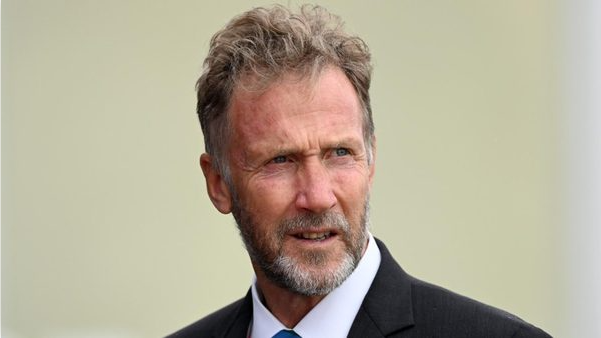
Vaibhav Tripathi
Cricket and controversy can never be kept too far apart for too long. In the times we live in, a new dispute seems to arise almost every other day, with the latest stirred by Chris Broad. The former match referee has accused the BCCI of influencing match-related decisions 20 years ago, when Sourav Ganguly was India’s captain.
Having served as a match referee for more than two decades, Broad reflected on his tenure during a recent interview. The former England international spoke about how the ICC used to be lenient towards the Indian team whenever they had a slow over-rate, citing an example from a game he was officiating.
“India were three or four overs down at the end of a game, so it constituted a fine,” Broad said in an interview with the UK’s The Telegraph. “I got a phone call saying, ‘Be lenient, find some time because it’s India.’ And it’s like, right, OK. So, we had to find some time, brought it down below the threshold. The very next game, exactly the same thing happened. He [Sourav Ganguly] didn’t listen to any of the hurry-ups, and so I phoned and said, ‘What do you want me to do now?’ and I was told, ‘Just do him.’”
These remarks clearly suggest that Broad was pressured to be lenient with the Indian team. By making such claims, he effectively accused the BCCI of politicising matters. However, if the BCCI truly wielded such influence, why wasn’t Broad stopped back in 2005 when he handed Ganguly a six-match ban? The board could easily have exercised its supposed power to save the then-Indian captain — yet that didn’t happen, which itself contradicts Broad’s statement.
After Ganguly’s appeal, Justice Albie Sachs reduced the six-match ban to four in July 2005. Even so, Ganguly missed the first two matches of the Indian Oil Cup in Sri Lanka, which arguably contributed to him being stripped of the India captaincy.
The truth is, Broad was too harsh on Ganguly during that ODI series, played in April 2005. Jamshedpur and Ahmedabad, the cities that hosted the third and fourth ODIs, were oppressively hot. With the sun beating down and the conditions extreme, there were numerous breaks taken during those games. The Ahmedabad gave also saw a thrilling last-over finish, with Pakistan chasing down 315. Yet those factors were not taken into consideration by Broad, who imposed a fine in the first match, followed by the ban later.
Sections of the overseas media also seem intent on running a propaganda campaign — creating false narratives against the BCCI, as the board has become the commercial centre of world cricket. The fact that the BCCI is now the sport’s superpower is something many find hard to digest.
Follow Revsportz for latest sports news





